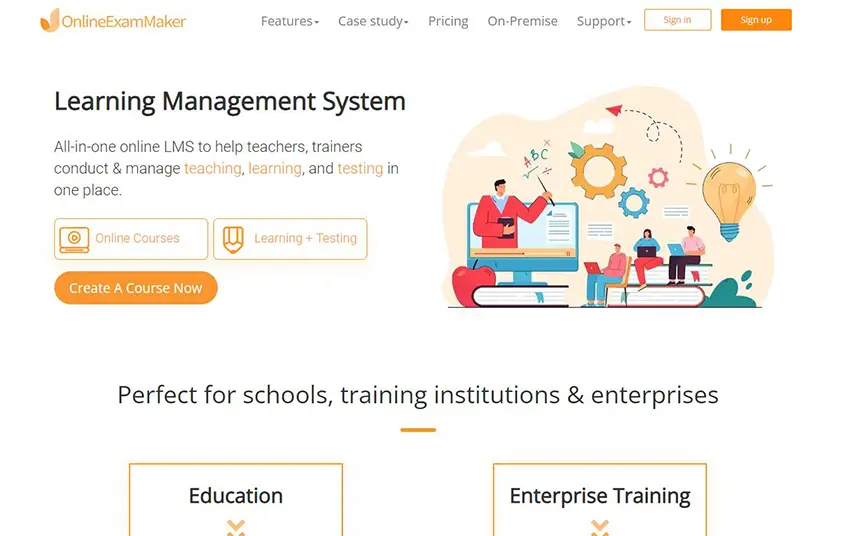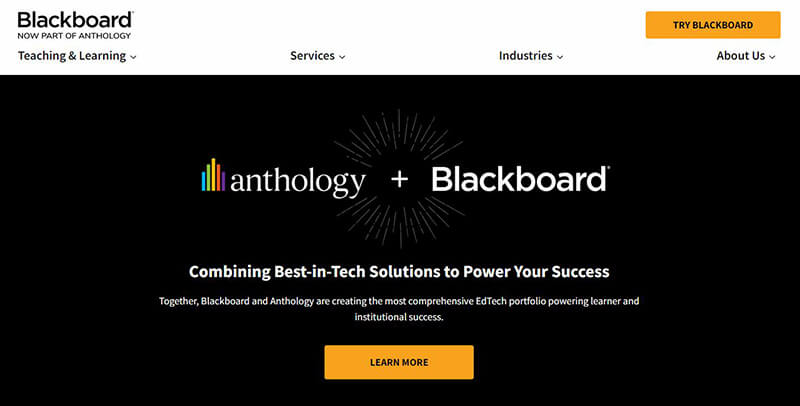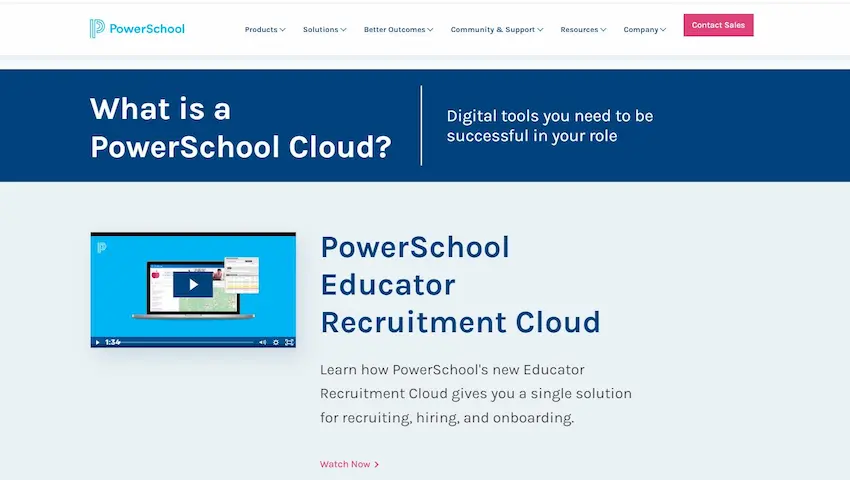A cloud-based Learning Management System (LMS) is a web-based platform used to plan, deliver, manage, and evaluate content for educational courses. “Cloud-based” means that the LMS is hosted on the provider’s servers and accessed via the internet, rather than being hosted on a local server or on-premises.
Why online Learning Management System is important to trainers?
An online Learning Management System (LMS) offers numerous advantages to trainers, making it an indispensable tool in modern education and corporate training landscapes.
Here are several reasons why an LMS is important to trainers:
Centralized Content: Trainers can store all their content in one central location, ensuring consistency in delivery and easy access for updates or modifications.
Scalable Training: An LMS allows trainers to deliver courses to a few learners or thousands of them simultaneously without needing to scale their personal efforts linearly.
Flexibility: Trainers can offer courses that learners can access anytime and anywhere. This flexibility can enhance the learning experience, especially for those with varying schedules.
Tracking and Reporting: LMS platforms provide detailed tracking of learners’ progress, engagement, and performance. This data is crucial for trainers to assess the effectiveness of their training and to identify areas for improvement.
Consistent Delivery: Every learner receives the same content, reducing variability in the training process. This ensures that all learners are on the same page, making assessments and outcomes more consistent.
Interactive Features: Many LMS platforms provide tools for quizzes, forums, gamification, and other interactive features that can enhance the learning experience and keep learners engaged.
Cost-Efficiency: While there’s an initial cost to set up and perhaps a subscription fee, trainers save in the long run by reducing or eliminating costs associated with physical venues, printed materials, and travel.
Integration with Other Tools: Many LMS platforms can be integrated with other tools such as CRM systems, webinar platforms, and HR systems, creating a seamless experience for both trainers and learners.
Continuous Learning: With an LMS, trainers can offer supplemental resources, follow-up courses, or advanced content, fostering a continuous learning environment.
When trainers are seeking an effective Learning Management System (LMS), they need to consider certain features that will help enhance the learning experience for their audience while also simplifying their own workflow.
Here are some key features to look for in an LMS:
1. User-Friendly Interface:
• The platform should be intuitive and easy to navigate, both for trainers and learners.
2. Course Creation and Management:
• Tools for creating, importing, or curating content.
• Options to structure courses with modules, lessons, quizzes, etc.
3. Advanced Tracking and Analytics:
• Comprehensive reporting tools to track learners’ progress, course completions, quiz results, and engagement metrics.
• Insight into areas where learners might be struggling.
4. Integration Capabilities:
• Ability to integrate with other tools such as webinar platforms, CRMs, payment gateways, and more.
5. Customization and Branding:
• Options to tailor the LMS interface to match the organization’s branding.
• Customizable course layouts and templates.
6. Interactive Features and Tools:
• Quizzes, surveys, interactive videos, and gamification elements.
• Forums, chats, and other communication tools for collaboration and engagement.
7. Mobile Access and Compatibility:
• A mobile-responsive design or a dedicated app, enabling learning on-the-go.
• Features ensuring courses display properly on various devices.
8. Security and Data Protection:
• Encryption and other security measures to protect user data.
• Compliance with regulations such as GDPR.
9. Assessment and Feedback Tools:
• Creation of quizzes, tests, and assignments with various question types.
• Automated grading and feedback mechanisms.
10. SCORM and xAPI Compatibility:
• Support for SCORM and xAPI standards to ensure interoperability and integration of externally developed content.
11. E-commerce Features:
• If selling courses, look for built-in payment gateways, discount code options, and subscription models.
12. Collaboration and Social Learning Tools:
• Features like discussion boards, peer reviews, and group projects to foster collaboration among learners.
13. Multimedia Support:
• Ability to embed or integrate various media types like videos, audios, PDFs, and interactive elements.
Choosing the right LMS based on these features can greatly enhance the training process, making it more efficient for the trainer and more enriching for the learner.
For trainers, selecting the right LMS can make all the difference in delivering an engaging and efficient learning experience. Cloud-based LMSs, in particular, have emerged as frontrunners, offering flexibility, scalability, and a host of features that cater to modern training needs.
In this article, we delve into the top 8 cloud-based LMSs that every trainer should consider for their e-learning endeavors.
- 1. OnlineExamMaker
- 2. Canvas
- 3. Blackboard
- 4. TalentLMS
- 5. Teachable
- 6. Thinkific
- 7. Kajabi
- 8. Schoology
1. OnlineExamMaker

OnlineExamMaker is an innovative cloud training management software designed to streamline and enhance the training processes within organizations and schools. The easy-to-use learning management platform designed to provide educators, administrators, and learners with a single robust, secure, and integrated system to create personalized learning environments.
Unique Features:
Course Creation and Management: OnlineExamMaker offers an intuitive interface for creating and managing training courses efficiently.
Multimedia Integration: The software supports multimedia elements like videos, presentations, and interactive modules for engaging training content.
Automated Workflows: OnlineExamMaker automates training workflows, including course scheduling, notifications, and registration management.
Integration Capabilities: Seamlessly integrate with HR and learning management systems to streamline training processes.
Mobile Learning Experience: Access courses and content on-the-go with a mobile-friendly learning experience.
Real-time Feedback and Support: Provide timely feedback and support to learners for personalized learning experiences.
Create Your Next Quiz/Exam with OnlineExamMaker
2. Canvas

Overview and Popularity: Canvas is a modern LMS used by many educational institutions around the world. Known for its clean interface and cloud-based system, it has gained traction in both the academic and corporate sectors.
Unique Features:
Canvas stands out for its seamless integrations with a myriad of tools, be it grading systems, multimedia embeds, or third-party applications. Its design is also remarkably user-friendly, making course creation and management straightforward.
Trainer Benefits:
With Canvas, trainers can focus more on content delivery and less on technical hurdles. Its intuitive interface ensures a shorter learning curve, and the vast integration options mean trainers can incorporate a variety of tools into their courses seamlessly.
3. Blackboard

Blackboard Learn is one of the veteran LMS platforms, popular especially among higher education institutions. It offers a comprehensive suite of tools and features tailored for academic learning and training.
Unique Features:
Blackboard is known for its advanced analytics, which provide deep insights into learner progress and engagement. It also boasts top-notch collaboration tools, including discussion boards, wikis, and group workspaces.
Advantages for Trainers:
Trainers using Blackboard can take advantage of its rich analytics to adjust course content and improve learner outcomes. The collaborative features also allow trainers to foster an interactive learning environment, promoting peer-to-peer learning and discussion.
4. TalentLMS

Introduction to the Platform: TalentLMS is a versatile cloud LMS designed for businesses of all sizes. It’s known for its simplicity, scalability, and customization options.
Unique Features:
TalentLMS shines in gamification, allowing trainers to incorporate game elements into courses to boost engagement. It also provides a suite of customization options, from branding to course structure.
Why Trainers Prefer It:
The platform simplifies many aspects of e-learning, from course creation to tracking progress. The gamification features can be a game-changer for trainers looking to make their courses more interactive and engaging.
5. Teachable

Teachable offers a platform for individuals, educators, and organizations to create and sell their own online courses. Its emphasis is on making course creation and monetization as straightforward as possible.
Unique Features:
Teachable handles everything from web hosting to payment processing. Its drag-and-drop builder allows for easy course creation without any technical expertise. Additionally, it has native tools for sales and marketing, making it easier for trainers to monetize their content.
Why It’s Great for Trainers:
Trainers looking to monetize their courses will find Teachable especially useful. Its built-in tools for marketing and sales, combined with an intuitive course builder, make it a one-stop-shop for online educators.
6. Thinkific

Thinkific is a platform that allows trainers to create, market, and sell online courses. It emphasizes customization, allowing trainers to design courses that align closely with their brand or teaching style.
Unique Features:
Thinkific offers full control over student data and a rich suite of marketing tools. It also supports memberships and subscriptions, enabling trainers to establish recurring revenue streams.
Trainer Benefits:
Thinkific provides trainers with extensive customization options, ensuring their courses stand out. The ability to create membership sites or subscription-based courses can be particularly advantageous for those looking to build a stable income.
7. Kajabi

More than just an LMS, Kajabi is an all-in-one platform that caters to online businesses, offering tools for course creation, website building, email marketing, and more.
Unique Features:
Kajabi integrates the functionalities of several tools into one. Apart from its LMS capabilities, it offers email automation, sales funnels, website builders, and a CRM system.
Advantages for Trainers:
Trainers using Kajabi can manage almost every aspect of their online teaching business from one platform. This integrated approach simplifies processes and ensures a cohesive user experience for students.
8. Schoology

Schoology is an LMS that blends seamlessly into the digital ecosystem of many educational institutions. It’s used by K-12 schools, colleges, and universities to enhance the teaching and learning experience.
Unique Features:
Schoology provides tools for homework submission, grading, and performance analytics. Its standout feature is its strong emphasis on collaboration, with integrated discussion boards, messaging, and group work capabilities.
Why It’s Great for Trainers:
For trainers working within academic institutions, Schoology offers an integrated solution that facilitates not only content delivery but also communication and collaboration. Its tools are designed to enhance both synchronous and asynchronous learning experiences.
In the rapidly-evolving world of online education, each of these LMS platforms offers unique strengths. The right choice will depend on the specific needs, goals, and context of the trainer or organization.